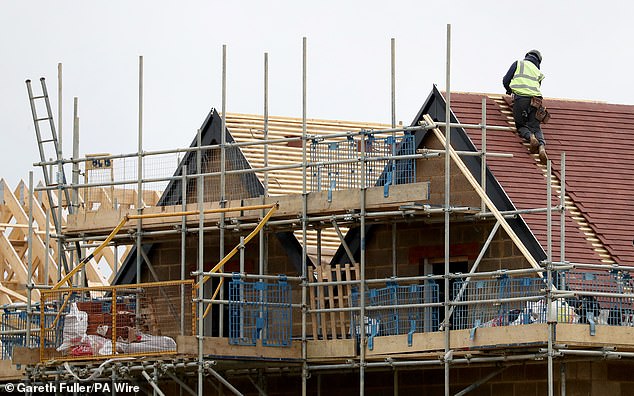Table of Contents
- S&P Global UK Construction PMI gave a reading of 53.3 for December
The British construction sector saw its weakest growth in six months in December due to reduced house construction work.
The closely watched S&P Global UK Construction Purchasing Managers’ Index (PMI) gave a reading of 53.3, down from 55.2 in November.
This was the lowest score since June 2024 and below the 54.4 predicted by analysts, although any figure above the 50.0 threshold denotes expansion, while all figures below indicate contraction.
Home construction levels fell for the third month in a row, with respondents blaming high borrowing costs as well as weak consumer demand and confidence.
Construction companies responded to the reduced volume of new orders by cutting their input purchases for the first time in eight months.
Housing development activity has been subdued over the past three years due in part to sharp increases in borrowing costs in response to higher interest rates.
Weak market: the British construction sector had its lowest growth in six months in December
The Bank of England raised the UK base rate on 14 consecutive occasions between late 2021 and mid-2023 to try to control rising inflation.
While it recently lowered interest rates from 5.25 percent to 4.75 percent, mortgages remain much more expensive than they have been for several years.
Residential work was the only construction subcategory in the S&P survey to see output fall in December, while commercial activity and civil engineering reported readings of 55.0 and 52.9, respectively.
The S&P noted “improving bidding opportunities” in the commercial construction industry, but cuts to residential development projects and a shortage of new businesses to replace completed infrastructure work.
However, almost half of those interviewed expect production to increase during 2025, and only 15 percent anticipate a decrease.
Tim Moore, chief economic officer at S&P Global Market Intelligence, said “concerns about the demand outlook” negatively affected growth forecasts for the construction sector.
He added: “Although confidence recovered after a post-budget dip in November, it was still much weaker than in the first half of 2024.
“Many businesses expressed concern about cuts to capital spending and bleak projections for the UK economy.”
The S&P figures come a day after it revealed that service industry employment shrank at its fastest pace in nearly four years in December due to weaker demand and higher payroll costs.
He pointed to “anecdotal evidence” that customer confidence declined after Chancellor Rachel Reeves’ first budget.
Reeves announced in October that employers’ National Insurance contributions would rise from 13.8 per cent for annual staff salaries over £9,100 to 15 per cent for salaries over £5,000 from next April.
It also said the national living wage would grow by 6.7 per cent to £12.21 an hour, while the national living wage for 18-20 year olds would rise by 16.3 per cent to £10. per hour.
Thomas Pugh, economist at RSM UK, said: “While the focus is currently on the costs imposed by the Budget, as greater government spending and investment begins to flow, much of it on infrastructure investment, this should help drive demand.”
“Overall, the subdued message from the construction PMI in the fourth quarter reflects the same trends we are seeing in the broader economy, but there are good reasons to expect 2025 to be a stronger year, both in the construction industry as in the economy in general.
DIY INVESTMENT PLATFORMS

AJ Bell

AJ Bell
Easy investing and ready-to-use portfolios

Hargreaves Lansdown

Hargreaves Lansdown
Free Fund Trading and Investment Ideas

interactive inverter

interactive inverter
Fixed fee investing from £4.99 per month

sax

sax
Get £200 back in trading fees

Trade 212

Trade 212
Free trading and no account commission
Affiliate links: If you purchase a This is Money product you may earn a commission. These offers are chosen by our editorial team as we think they are worth highlighting. This does not affect our editorial independence.


